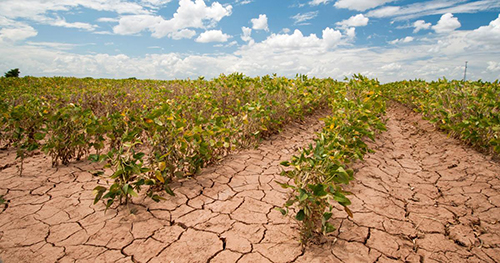
How Climate Change Impacts Local Farms
Climate change has been apparent throughout the world’s history due to natural forces such as solar radiation, volcanoes, etc. However, humans can also impact climate change. The current climate change situation in the world is the cause of a mix of natural and human forces. What does climate change look like in our state?
According to the NOAA Centers for Environmental Information, the average annual temperature in Illinois had increased by about 1°F since the beginning of the 20th century. However, there is seasonal variation with the warming. Spring temperatures have increased by about 2°F, while summer temperatures have seen little variation. This may not seem like a big increase on a day-to-day scale, but we are projected to reach “historically unprecedented warming” by the end of the 21st century.
Climate change not only affects the temperature, but it affects precipitation. Again, according to the NOAA Centers for Environmental Information, “Precipitation in spring and summer has generally been above average over the past two decades.” This affects our local agriculture positively with adequate soil moisture, but also negatively with delayed spring planting for many farmers. Precipitation in spring and winter is projected to increase further, which is a threat to further delays in spring planting.
We know that climate change is affecting our local agriculture with delayed planting, but how do our local farmers and people in the agriculture community feel? What have they seen with climate change, how is it affecting their lives, and how are they adapting? I spoke with Darren Davis, a McLean farmer, and Bryce Hoffman, Olympia High School agriculture teacher about these questions.
Darren Davis farms on a family farm outside of McLean, IL. Farming runs deep in his family, Davis stated “My dad, Michael Davis, and grandparents, Gearlod and Winneford Davis, farmed. We probably farmed for many generations before them. My mom’s dad, Fred Hucker, was also a farmer.” Davis has lived his whole life around farming, and we discussed what farming practices he has seen change in his lifetime.
Davis has seen farmers doing less tillage, which helps the environment as far as erosion. However, they are required to use more chemicals to kill weeds so that there is less tillage. Davis estimated that the increase in chemical use for weeds has happened in the last 50 years. For machinery, he has seen a large improvement on how efficient and less harmful to the environment tractors are.
Personally, Davis is adapting to any changes with the climate by trying to plant earlier. He has noticed that it seems like in the past few years there has been larger rainfall and more storms that seem to be stronger than earlier in his lifetime. Davis said, “There really isn’t much you can do for your crops regarding rainfall.”
Olympia agriculture teacher, Bryce Hoffman, has also noticed more rainfall and extreme weather in the last few years. Hoffman, who has been teaching for 22 years, discussed what he has seen with climate change and farming from the teaching perspective and as someone who is very active in the ag community. Hoffman began his teaching career at Williamsville High School and taught at Tri Valley and Monticello before he landed at Olympia High School 6 years ago.
Hoffman stated, “There are a lot of things in ag that have changed in the last 22 years, like the market weight of a hog or how many bushels of corn you want to grow, but we haven’t seen a huge direct impact from climate change other than the more intense weather.” He has noticed more sustainable practices in agriculture and teaches about sustainable agriculture to his classes. He has noticed farmers are continually trying to find new ways to be environmentally friendly, and some companies are offering farmers incentives to farm as sustainably as possible.
From both the farmer and ag community member perspective, it seems like farmers are constantly working to find sustainable agricultural practices but haven’t seen a huge direct impact from climate change yet. Davis and Hoffman both agree that if climate change takes a turn for the worse, they are confident that the agriculture community will find a way to adapt and overcome the challenges.